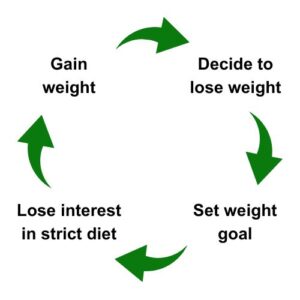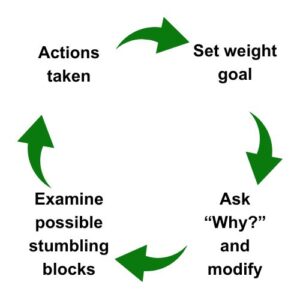In a previous post, we outlined how our ego hurts us in that it is impatient.
Here’s another sneaky way your ego hurts us: it keeps you out of touch with reality.
Our identity, the identity that we form throughout our lives, can also become our greatest enemy when it gets set on being, achieving, or overcoming something that is unrealistic and counterproductive. Sure, there’s great benefit to setting a goal and working hard to achieve it.
However, when your goal becomes intertwined with your ego, your ego can cause you to ignore signs of imminent failure because you’re so committed to the perceived outcome rather than reality.
Below we’ll analyze two scenarios where understanding the Fixes that Fail archetype can keep us from self-sabotage and start making lasting positive change in our lives.
Fix that Fails: Weight loss
Your high school reunion is coming up and you realize that you’ve put on a few extra pounds since you saw most of your former classmates, and you’ve been needing some motivator. So, you set a goal to lose weight.
You use the SMART goal format to say, “Today is February 1. I will lose 40 lbs by May 31 by going 100% keto.” It’s a big goal, but you think it’s achievable.
There can be several outcomes from this one goal.
In your perceived ideal state, you set the goal and meet the goal in time for your reunion. Everyone ogles over you and wants to know your secret. You maintain that new weight forever more and your life is complete.
The most undesirable state is that you set the goal and realize that you’ve gained weight since you set your goal. You drown your sorrows through a tube of Pringles and decide that you didn’t want to go out of your way for those losers anyhow! Why should you upend your life just for them and that one event?
The middle ground is probably relatable where you set the goal and achieve it, or something close to it, but you also make huge sacrifices in life! You set this goal and your ego is so dead set on achieving it, making that specific date, that you are willing to do anything you need do to to meet that goal. You’re not a quitter!
The problem is that it’s not sustainable. Considering that an estimated 65% of dieters revert to their previous weights within three years of starting a diet, the results seem poor.

A Better Approach: Root Cause
A more sustainable way to handle this scenario would be to set your goal and then ask “Why?” for this goal.
If this was your weight in high school, it’s worth examining if this is really a necessary goal now.
Also – who the hell cares what people at the reunion think about you!

Your motivator needs to be a stronger personal desire rather than what your ego wants to show the world about you.
A better approach to this weight goal is to take your ego out of the equation and identify the long term reasons for the correct weight for your body.
Set your realistic goal, modify your approach, identify as many possible obstacles between you and that goal as possible and set an action plan that helps to minimize them.
Finally, take action and reinforce the direction you’re going through those actions as you continue around the cycle.
Reinforce those behaviors that set you up for success rather than provide short-term fixes that fail in the long-term. Your ego should not be the driver in these scenarios because it will often-times lead you astray. Instead, identify what your consciousness knows to be true and follow the path with informed decisions and desires.
Sometimes it can be hard to keep track of healthy eating throughout the day. That’s why we added it as a healthy habit to track in The Agile Life Plan 4-week kick-start free course. Try it out for yourself 🙂





